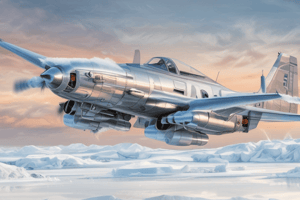Podcast
Questions and Answers
Homo-nucleation occurs naturally in pure water at -20°C.
Homo-nucleation occurs naturally in pure water at -20°C.
False (B)
Higher humidity decreases the rate of ice creation.
Higher humidity decreases the rate of ice creation.
False (B)
Agitation can decrease the rate of ice creation.
Agitation can decrease the rate of ice creation.
False (B)
Recrystallization occurs when large ice crystals break down into smaller ones.
Recrystallization occurs when large ice crystals break down into smaller ones.
Homogeneous nucleation requires a nucleation site.
Homogeneous nucleation requires a nucleation site.
Higher pressure always increases the freezing point of water.
Higher pressure always increases the freezing point of water.
Study Notes
Ice Creation Processes
Nucleation
- Nucleation is the process by which a liquid turns into a solid (ice)
- Requires a nucleation site, such as a dust particle, salt crystal, or imperfection in the container
- Homo-nucleation: occur naturally in pure water at -40°C
- Hetero-nucleation: occur at higher temperatures in the presence of a nucleation site
Ice Formation Mechanisms
- Homogeneous Nucleation: water molecules come together to form a crystal lattice structure
- Heterogeneous Nucleation: water molecules accumulate on a nucleation site to form ice
- Recrystallization: small ice crystals merge to form larger ones
Factors Affecting Ice Creation
- Temperature: lower temperatures increase the rate of ice creation
- Humidity: higher humidity increases the rate of ice creation
- Pressure: higher pressure can lower the freezing point of water
- Impurities: can act as nucleation sites or affect the freezing point of water
- Agitation: can increase the rate of ice creation by introducing air or increasing the surface area of water
Ice Creation Processes
Nucleation
- Liquid turns into solid ice through nucleation
- Requires a nucleation site (e.g., dust particle, salt crystal, or container imperfection)
- Homo-nucleation occurs naturally in pure water at -40°C
- Hetero-nucleation occurs at higher temperatures with a nucleation site
Ice Formation Mechanisms
- Homogeneous nucleation: water molecules form a crystal lattice structure
- Heterogeneous nucleation: water molecules accumulate on a nucleation site to form ice
- Recrystallization: small ice crystals merge to form larger ones
Factors Affecting Ice Creation
- Lower temperatures increase the rate of ice creation
- Higher humidity increases the rate of ice creation
- Higher pressure can lower the freezing point of water
- Impurities can act as nucleation sites or affect the freezing point of water
- Agitation increases the rate of ice creation by introducing air or increasing the surface area of water
Studying That Suits You
Use AI to generate personalized quizzes and flashcards to suit your learning preferences.
Description
Learn about the process of nucleation, including homogeneous and heterogeneous nucleation, and the mechanisms of ice formation in this quiz.




